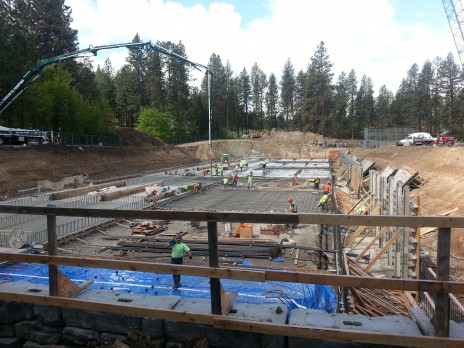A Cleaner River Faster: City of Spokane conference presentations
 “A cleaner river faster” is the short hand phrase the City of Spokane uses to explain its multipronged approach to improving water quality in the Spokane River. At the Spokane River Forum Conference on November 19th and 20th, the city will present the research, projects, best practices and strategies being employed to meet the challenge.
“A cleaner river faster” is the short hand phrase the City of Spokane uses to explain its multipronged approach to improving water quality in the Spokane River. At the Spokane River Forum Conference on November 19th and 20th, the city will present the research, projects, best practices and strategies being employed to meet the challenge.
Marlene Feist, the City’s Utilities Communications Manager, said, “When we took a holistic approach to the pollutants of concern, it was obvious no single strategy would work. We’re employing multiple approaches and partnering in multiple ways to get the job done.”
Here are some examples of innovation the City is working on that municipalities, universities, environmental and engineering firms, the conservation community and others can learn from and talk with City officials about at the conference:
- A new stormwater management project integrated with a project to rehabilitate the downtown section of the Lincoln/Monroe corridor. The stormwater piece combines best practices like swales, gray infrastructure piping done in conjunction with street improvements, and use of a newly discovered gravel paleochannel for infiltration.
- Updates on the Integrated Clean Water Plan includes projects to address Combined Sewer Overflows (CSO), improvements at the City’s wastewater treatment plant, and stormwater projects. The City is getting ready to sell$200 million dollars in “green bonds” as an innovative financing mechanism for the work.
- Preliminary results from PCBs that are in municipal products, and how both the city and state passed an ordinance and legislation respectively to provide government purchasing preference to avoid using these products.
- Working with Gonzaga University and The Lands Council to implement storm gardens in the Shadle area. The group is exploring the use of biochar as an alternative to compost for stormwater gardens at the Shadle project, thus capturing both pollutants and reducing nutrient leaching.
- Testing of membrane technology at the wastewater treatment plant as part of determining the best available technology for tertiary treatment at the plant.
“At more than $300 million, this series of projects represents the largest public infrastructure investment the City has ever made,” Feist said. “We want to talk about our experiences with others in our region and learn from them, too. This conference provides a great opportunity to share the best ideas and plans for the health of the Spokane River, our precious aquifer, and future generations.”
Register Now. Remember, early bird registration closes October 17th.
